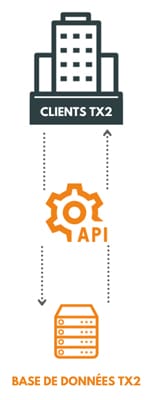In the ever-changing world of business, process automation and simplification are essential. Businesses are constantly looking for ways to improve efficiency, particularly in key areas such as data exchange and invoice management.
APIs, or Application Programming Interfaces, are one of the cutting-edge technologies that have transformed the way we manage data.
In this article, we’ll explore what an API is, how it works, and its benefits. We will also see why it has become an essential tool in the field of EDI (Electronic Data Interchange) and the dematerialization of invoices.
What is an API?
An API, or Application Programming Interface, is a set of rules and protocols that allow different software programs to communicate with each other. It acts as an intermediary that allows separate computer systems to exchange data transparently.
To simplify, imagine an API like a waiter in a restaurant, where the chef (the software) receives orders (requests) from waiters (other software) and returns dishes (data) ready to be served.
How does an API work?
APIs work through a set of requests and responses. When a software wants to access data or functionality from another software, it sends a request to the latter’s API.
The API processes this request and returns the requested information to the software. This communication is done in a standardized way, often using common protocols such as HTTP.
The advantages of APIs in EDI and invoice dematerialization
1. Easy integration
APIs simplify system and software integration. In the context of EDI and invoice dematerialization, they enable fluid communication between ERP (Enterprise Resource Planning) systems, accounting software and data exchange platforms.
This means businesses can automate their workflows and processes without having to perform tedious manual tasks. In addition, the use of API makes it possible to combine the phases of transfer, control, integration and acknowledgment of data. This allows for instant exchanges and more precise tracking.
2. Time saving
APIs speed up processes. Rather than manually entering data, businesses can exchange information in real time, reducing errors and delays.
Invoices can be processed faster, improving cash flow and strengthening relationships with suppliers and clients.
3. Personalization
APIs are flexible. They allow companies to customize their integration according to their specific needs, without having to modify the transfer protocol on which it relies.
This means you can tailor APIs to meet the unique requirements of your business, whether that’s specific data flows or custom formats with an exclusive focus on the business side.
4. Enhanced security
APIs rely on standardized and modern security mechanisms, guaranteeing their durability over time and protection of data during its transfer. This is essential when dealing with sensitive data, such as financial information found in invoices. This allows businesses to exchange data with confidence, knowing it is protected against potential threats.
Why use an API?
Using an API in the context of EDI and e-invoicing is essential to staying competitive and up to date. Businesses that adopt API-based solutions are better equipped to automate their processes, reduce costs and improve efficiency. They thus offer a superior customer experience.
In conclusion, APIs tend to become the core of modern EDI and e-invoicing solutions. They simplify integration, save time, enable customization and enhance security. Businesses that choose to adopt API-based solutions can transform the way they manage data and gain a competitive advantage.
API with TX2 CONCEPT
We provide our clients and partners with an API allowing external applications to integrate with the services of our platforms.

Our API allows, for example:
- Sending and receiving flows
- Status tracking
- Search and retrieval of flows, documents, etc.
- Return of invoices (PDF, Factur-X, etc.)
And other business processing such as transformations and translations, as well as checks and validations.
In addition, TX2 CONCEPT offers in its standard offer development services for API connectors with existing environments, whatever the direction of flow.
If you’re ready to modernize your EDI and invoice management processes, consider API integration to maximize efficiency and improve your data management.
To learn more about how our company can help you realize these benefits, please contact us.

